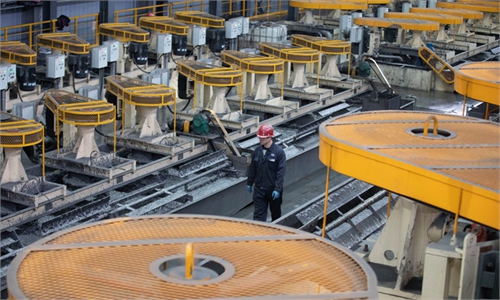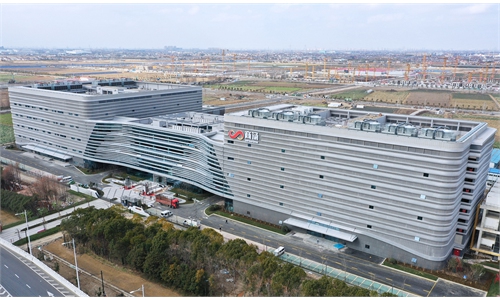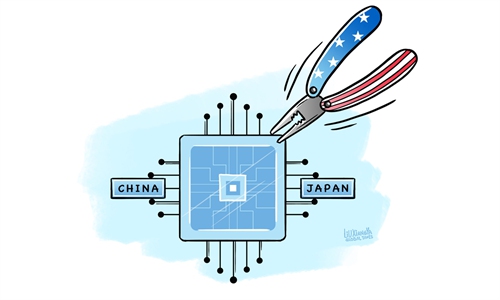
AI Photo: VCG
The reported move by the US to press Japan and the Netherlands to add fresh restrictions on China's semiconductor sector laid bare the growing anxiety in the US over Beijing's recent significant technological progress, as many of Washington's crackdowns against Chinese industries - from 5G to new energy - have proven to be futile, and it is also running out of chips to target in the ramped-up blockade, industry observers said.
Bloomberg quoted industry insiders as saying on Wednesday that US Under Secretary of Commerce for Industry and Security Alan Estevez will visit Japan and the Netherlands to press his counterparts in Tokyo and The Hague to put more limits on the activities in China of Dutch supplier ASML Holding NV and Japan's Tokyo Electron.
Estevez will highlight restrictions on China's production of high-bandwidth memory (HBM) chips, for which the two companies are suppliers, the report said.
According to industry insiders, HBM is a kind of memory chip with stronger storage ability and lower power consumption, so it supports faster algorithm capabilities that are indispensable for creating an AI hardware ecosystem.
"The US has been further tightening restrictions on the development of China's cutting-edge technologies. Previously it was 5G, but obviously the suppression failed. Now, it is extending its moves to a number of sectors involving AI, even to niche sectors that receive little attention. This also reflects Washington's intense nervousness about seeing China's technological gains," Ma Jihua, a veteran telecom industry observer, told the Global Times on Wednesday.
In response to the potential US action, Lin Jian, a spokesperson for China's Foreign Ministry, said at a regular press briefing on Wednesday that China firmly opposes Washington's move to create bloc confrontations and even extend them to the fields of the economy, trade and technology, coercing other countries to suppress China's semiconductor industry.
The US action in substance is aimed at maintaining its hegemony, depriving China of its legitimate right to development, and artificially disrupting the stability of global industrial chains to monopolize the high end of the value chain, Lin said.
The move will severely hinder the development of the global semiconductor industry and ultimately backfire, harming others without benefiting the US, Lin said.
"We hope that relevant countries can distinguish right from wrong, firmly resist coercion, jointly uphold a fair and open international economic and trade order, and safeguard their own long-term interests," Lin said.
According to Ma, the US targeted China's general memory chip production years ago, but Chinese companies managed at the time to break through the restrictions and catch up with US rivals.
"The HBM chip curb, if imposed by Japan and the Netherlands, could affect Chinese producers to a certain extent. But it is one of the last few cards the US could play in the blockade in the field," Ma stressed.
In October last year, the Biden administration announced measures to block China, among other countries, from buying high-end AI chips designed by Nvidia and others, the BBC reported. Bloomberg reported in early June that the Biden administration was weighing actions that would target a type of high-tech chip architecture known as gate all-around, which is a computing system needed to build and operate AI models.
The reported new measures are also deemed as a continuance of Washington's small clique approach to rally support from its allies including Japan and the Netherlands to restrict China, analysts said.
It is uncertain how the Japanese and Dutch government will react to US demands for additional measures. But Ma called on relevant governments and companies to be alert to Washington's malicious plot, which will pass on the cost of losing one of the world's largest markets to its allies, rather than having to bear the consequence alone. He also urged the two countries to resist the pressure and act more pragmatically.
"There's limited benefit in bending to pressure from the US, and I guess some of them will adopt a wait-and-see attitude until the outcome of US presidential election in November," Ma said.



